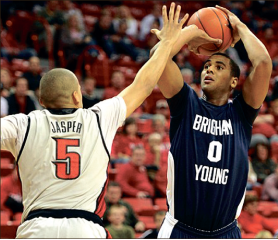Honor at all costs
Losing a player to injury just a few weeks prior to a national tournament is a big deal, but it happens to most teams at some point in their history. But losing a player to an honor code violation is something that few schools have to face.

Benched — BYU player Brandon Davies’ actions could cost his team their shot in the Big Dance. Google photo
Brigham Young University (BYU), affiliated with the Church of Jesus Christ of Latter-Day Saints, was forced to suspend sophomore forward Brandon Davies last week because he admitted to having premarital sex with his girlfriend.
BYU’s honor code requires that students should “live a chaste and virtuous life,” according to the Washington Post. This includes refraining from premarital sexual relations.
Davies, who averaged 11.1 points and a team-leading 6.2 rebounds per game, was suspended for the remainder of the season last Tuesday, and decisions about his future with the school and team are still undetermined.
The 6-foot-9 forward was instrumental in BYU’s success this season. Prior to Davies’ suspension, the team was ranked No. 3 in the ESPN/USA Today coaches’ poll and, according to Andy Katz of ESPN.com, they were put on the No. 1 seed line for the West division in the latest bracketology report.
After Davies’ suspension, the Cougars lost to unranked New Mexico, 82-64, and lost their chances of a top seed. Many people, fans and reporters alike, are saying that Davies’ punishment is too harsh, or that his suspension should have been held until the team’s tournament run was over.
BYU’s head coach Dave Rose disagrees with these accusations, according to an article on ESPN.com.
“Everybody who comes to BYU, every student if they’re an athlete or not an athlete, they make a commitment when they come,” Rose said in the ESPN.com article. “A lot of people try to judge if this is right or wrong, but it’s a commitment they make. It’s not about right or wrong. It’s about commitment.”
Colleges and universities whose basketball teams play well enough to get into the big dance garner a great deal of media attention from the event. BYU will most likely not make it to the final four, but they gained plenty of media attention by upholding their principles. It would have been easy to ignore Davies’ faux pas and let him play but school officials decided that the university’s integrity was more important than a potential seat in the final four.
Notable BYU alumni who participated in their athletic program support their alma mater’s decision. Danny Aingee played for BYU prior to his long NBA career.
“You go through two interviews and sign a contract saying you’ll uphold the honor code,” said Ainge, who is president of basketball operations for the Boston Celtics, told FoxSports.com.
BYU made the correct ruling regarding Davies’ honor code violation. Like Rose said, students who choose to go to BYU, including athletes, agree and sign to obey the honor code. Davies broke the code, and he is now suffering the consequences. Any other student would have the same fate, so why should a student athlete be treated any differently? Even though BYU had, and perhaps still has, a very good shot at the Final Four, BYU administration was willing to forgo an almost guranteed spot in the final for to uphold and enforce the honor code.
